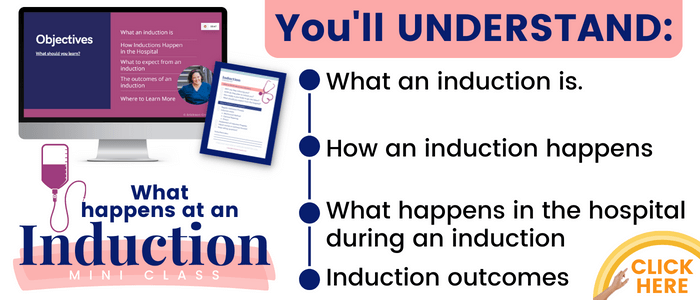📣 YOU are clearly getting prepared for pregnancy, birth & beyond — but do you wish your partner was more involved (looking for a teammate rather than just a cheerleader)? Couples love THIS! 💛🧡💚
Having an induction can bring up a lot of questions. At least I hope it does. Inducing labor brings more risk than going into labor on your own. Today we’re going to chat about the questions to ask your provider, and also answers some of the questions many patients have before their induction.
But first, how do I know all of this? Hi — I’m Hilary — The Pregnancy Nurse 👩⚕️. I have been a nurse since 1997 and I have 20 years of OB nursing experience, I am also the curly head behind Pulling Curls and The Online Prenatal Class for Couples. 🩺 I have started thousands of inductions with families and have answered just as many questions, so I’m a great resource for this.
Questions To Ask Your PROVIDER About Your Induction
It is a good idea to have a lengthy conversation with your healthcare professional before deciding on an induction.
1.Is there a reason for the induction? Unless this is something you’re just wanting (an elective induction) it’s important to ask your provider WHY they are wanting to do an induction (often it is for specific medical reasons, or baby’s health)
I have a post all about the reasons people get induced. and, a podcast on it:
Pro tip: Elective inductions aren’t normally offered til’ at least 39 weeks of pregnancy (close to your due date)
I think a lot of people think doctors love inductions, but I have a post on why doctors push inductions.
2. What are the risks and the benefits of this induction? This is informed consent, and important for both you and your provider for you to make an informed decision.
3. How do you plan to induce me? They may or may not have a plan (they may wait to see what your cervix is on the day of the induction).
4. How long do you think it will take? They may or may not know this, but they may have a guess.
I actually go into these questions a whole lot more in my Inductions Made Easy Class. I also go into more about how the inductions happen, and what to expect at the hospital!
I actually just did a podcast on being informed about your induction that you might enjoy:
Most Common PATIENT Questions About Induction
What are the benefits of being Induced?
The benefit can be two fold.
- You’re no longer pregnant
- Baby is out
If baby isn’t growing well or there are other issues with baby’s health, they will induce.
Often, women have their own medical issues or reasons (like high blood pressure) that they’d like the baby out.
Those are the main reasons that people are induced.
That, and doctors going out of town. But that sort of falls under #1.
What are the risks of being induced?
There are a few risks of induction (and you should definitely talk to your healthcare provider about your own risks — I am only speaking in general). There can definitely be potential problems to having an induction.
Contractions may be too hard
Sometimes we induce contractions that could be harder than your uterus would produce without induction agents. Babies don’t like to be squeezed too much or for too long (makes sense) so that can be problematic for them.
Your cervix might not open
Your cervix may just not be read, and no amount of medication or bothering it will cause it to open.
In that case — if you can’t wait to let mother nature do her thing. You would need a cesarean section.
All medications have risks
Most of the ways we induce you are medication. All medications come with risks of adverse reactions etc.
Mitigating Induction Risks
In order to limit these risks you will be monitored more frequently (often continuously — meaning the baby needs to be on the monitor all the time). You’ll have more frequent vital signs and assessments by your providers.
How do they usually start an induction of labor?
There are 3 basic induction methods?
Mechanical Induction
This includes things like:
- Foley bulb (literally stretches your cervix open)
- Stripping membranes (also called a membrane sweep — separates the bag of waters from the cervix and also sweeps up hormones in that area)
- Breaking your water (called artificial rupture of membranes — this may cause contractions)
Cervical Ripening Agents
This is different than the next list because these are meant to start small, softer contractions that “soften your cervix”
These medications include:
(and yes, that induction class goes into more detail on each of those options and what they are)
All of those are basically hormones (prostaglandins) that start contractions in pregnant women. Most often they are followed by….
Pitocin Induction
Pitocin is the “gold standard” induction. It is a synthetic version of the hormone oxytocin — what your body produces naturally to put you into labor. It is given IV.
It is often given to start if your cervix is three or more centimeters (although they could also try to just break your water at that point and see if you go into labor on your own then).
I have a whole article on Pitocin inductions.
Most often they pick one of the methods of induction after an internal examination based on how favorable your cervix is.
What does a “favorable cervix mean?
It just means it’s not soft and ready for Pitocin.
Most often your cervix softens the further you get into your pregnancy.
We also would like to see that your cervix has started to open before we induce but. However, if you have reasons you need to be induced, having a softened cervix won’t stop us from initiating an induction.
Why does my cervix need to be “softened”?
When you a feel a cervix it can feel soft, or harder like rubber. As you can imagine. Cervixes that feel more ilke rubber (think like a car tire) vs soft like a wheel of brie cheese… one tends to open-up easier.
That being said, cervixes can be come soft quickly or take a while. It’s all an experiment.
We actually “grade” your cervix on something called the Bishop score so that it is easier to measure how ready it is (I talk about how we score it in here).
How long will the induction take?
Goodness, wouldn’t that be nice to know. I actually have a whole article on how long an induction will take.
The key points are:
- How long it takes to get you into “active labor” — meaning your cervix is actively opening — this can take a while sometimes.
- Once your cervix starts to open, the textbooks say it should open about 1 cm per hour.
- You also need to expect an average pushing time of 2 hours on your first baby.
That all being said, most babies and uteruses haven’t read the textbook — so every body is different.
We also don’t say that “labor starts” when we start the induction. Yes, the induction process is going, but labor is different and happens when your uterus starts to contract and you’re in more pain.
Pro Tip: The induction process is different than spontaneous labor. Often people are surprised by that, but it is just a much more medical process.
That all being said, your provider likely has an idea of how long it will be when they schedule you (but keep in mind this is mostly an educated guess).
Why can’t I get my induction when I want it?
Inductions fall into two categories:
- Elective — this means there is no medical reason for the induction. Most providers won’t schedule this until you are at least 39 weeks, and often 40 weeks.
- Medically necessary — this means you have a condition that requires us to attempt to get the baby out earlier.
I have a whole post on 37 week inductions that talks a lot about those different reasons — however pain isn’t normally a reason to be induced so early.
At the hospital we may schedule several inductions each day. Those who have a medical need often get the first beds available. Then, we move to those who have chosen an elective induction.
As a hospital we are always triaging who has the greatest “priority of care”. Hence, we choose who goes when most often.
Can I move during my induction?
It depends on how you are being induced. Also depends on if your hospital has monitors that can monitor you as you walk around (often called telemetry monitors).
ALSO, your baby has to be able to be monitored as you walk
Problems can include the baby’s position, or sometimes how legs rub on bellies (and the ultrasound machine can only pick that up vs the baby).
At my hospital we have a monitor called The Monica. It often doesn’t work though, and while we can troubleshoot a lot. Some bodies just don’t allow it to pick up (but some it works great).
If movement is a key for you, let your provider team know — so they can brainstorm with you how to make that happen.
Can I eat during my induction?
It depends on how you are being induced.
Often, when our patients are on Pitocin our health care providers won’t allow them to eat.
And by “allow them to eat” I meant that I can’t give you food.
The reality is your doctor can’t make choices like that for you. You can always choose to eat if you want.
Those who have Cytotec or something to just soften the cervix can often eat.
However, for certain medical reasons or if there is a reason for a likely caesarean section, your doctor may limit your intake (and if that’s the case, they should let you know why).
Induction Questions FAQ’s
I’d recommend talking with your provider until you feel good about the decision you are about to make.
Most people in the medical community believe these medical induction methods are safer than castor oil or random herbal supplements. The hospital setting is more controlled.
While induced labour is different, you can still have a GREAT birth experience. I’ve seen it coutless times!
There is an increased use of pain medication when there is an induction, just take it one contraction at a time and do what works for you. If you really don’t want to use pain medication listen to this podcast on getting induced without an epidural.
Some recent research has shown that it may be just as safe (if not safer) than waiting to go into labor, if you are induced at your 39th week of pregnancy. Talk with your provider about what is best for you.
There can be. The best thing is to talk with your provider about your best option.
The actual contractions may be stronger, although our goal is to simulate regular labor contractions (they often do come on quicker though, and that is planned).
Beyond choosing to have an induction, it doesn’t change much about your birth plan (I talk all about birth plans in my free prenatal class).
Yes, it can be. Be sure to talk with your doctor about what the scientific evidence shows about what is best for you.
A cesarean section is major abdominal surgery and most providers recommend an induction over an elective cesarean (depending on your issues)
Ok, so there are some fast facts about inductions. But, if you want to know about the WHOLE thing start to finish, don’t miss Inductions Made Easy!
Want to do a vibe check before diving into the whole thing with me? — check out my free labor pro tips. It’s your first step toward getting in the driver’s seat of your birth.






 How Long Does it Take to Push Out A Baby?: The 3rd stage of labor
How Long Does it Take to Push Out A Baby?: The 3rd stage of labor
